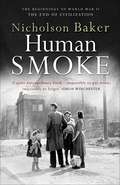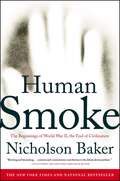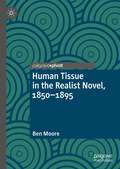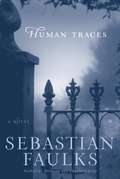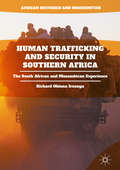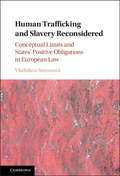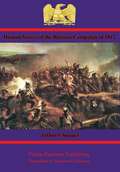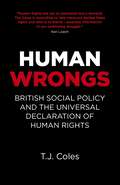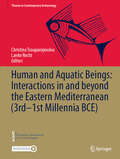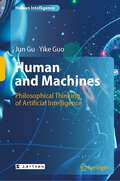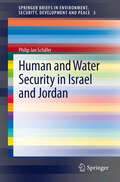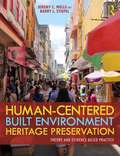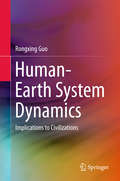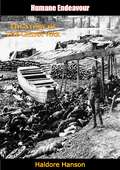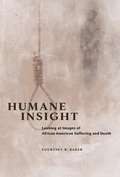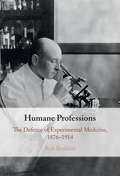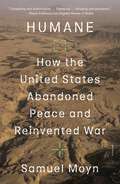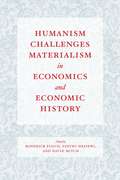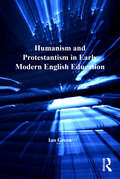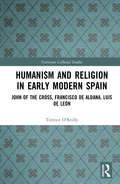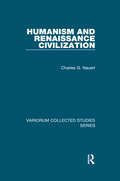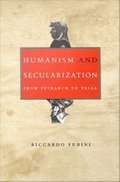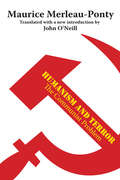- Table View
- List View
Human Smoke
by Nicholson BakerUnique, brilliantly-executed and sure to spark controversy and debate about our past as well as our future, HUMAN SMOKE powerfully illustrates the world's gradual and horrifying advance towards World War II and the Holocaust. Were the voices of the time predicting its inevitability? Meticulously researched and incredibly well-documented, Nicholson Baker uses sources including newspaper and magazine articles, radio broadcasts, memoirs and diaries to juxtapose hundreds of interrelated moments of decision, brutality, suffering and mercy - all cleverly structured in a series of powerful vignettes. Questioning the much-romanticised myths of the 1930s and '40s, Baker shows us that it was thanks in part to Churchill that Mussolini ascended to power so quickly, and that, before leading the United States against Nazi Germany, a young FDR spent much of his time lobbying for a restriction in the number of Jews admitted to Harvard. Conversely, HUMAN SMOKE also reminds us of those who had the foresight to anticipate the coming bloodshed and the courage to oppose the tide of history, as Gandhi demonstrated when he made his symbolic walk to the ocean - for which he was immediately imprisoned by the British. Praised by critics and readers alike for his exquisitely observant eye and deft, inimitable prose, Nicholson Baker has assembled a narrative within HUMAN SMOKE that unfolds gracefully, tragically and persuasively. An utterly compelling account of the sickening loss humanity has borne at its own hand which poses the question: Are we going down the same path again?
Human Smoke: The Beginnings of World War II, the End of Civilization
by Nicholson BakerBestselling author Nicholson Baker, recognized as one of the most dexterous and talented writers in America today, has created a compelling work of nonfiction bound to provoke discussion and controversy -- a wide-ranging, astonishingly fresh perspective on the political and social landscape that gave rise to World War II. Human Smoke delivers a closely textured, deeply moving indictment of the treasured myths that have romanticized much of the 1930s and '40s. Incorporating meticulous research and well-documented sources -- including newspaper and magazine articles, radio speeches, memoirs, and diaries -- the book juxtaposes hundreds of interrelated moments of decision, brutality, suffering, and mercy. Vivid glimpses of political leaders and their dissenters illuminate and examine the gradual, horrifying advance toward overt global war and Holocaust. Praised by critics and readers alike for his exquisitely observant eye and deft, inimitable prose, Baker has assembled a narrative within Human Smoke that unfolds gracefully, tragically, and persuasively. This is an unforgettable book that makes a profound impact on our perceptions of historical events and mourns the unthinkable loss humanity has borne at its own hand.
Human Tissue in the Realist Novel, 1850-1895 (Palgrave Studies in Literature, Science and Medicine)
by Ben MooreThis Pivot engages with current debates about anthropocentrism and the Anthropocene to propose a reappraisal of the realist novel in the second half of the nineteenth century. Through three case studies, it argues for ‘human tissue’ as a conceptual tool for reading that brings together biology, literature and questions of layering. This new approach is shown to be especially salient to the Victorian period, when the application of ‘tissue’ to biology first emerges. The book is distinctive in bringing together theoretical concerns around realism and the Anthropocene – two major topics in literary criticism – and presenting a new methodology to approach this conjunction, demonstrated through original readings of Charles Kingsley, George Eliot, and Emile Zola and two English-language writers he influenced (George Moore and Vernon Lee).
Human Traces: A Novel (Vintage International Ser.)
by Sebastian FaulksSixteen-year-old Jacques Rebière is living a humble life in rural France, studying butterflies and frogs by candlelight in his bedroom. Across the Channel, in England, the playful Thomas Midwinter, also sixteen, is enjoying a life of ease-and is resigned to follow his father's wishes and pursue a career in medicine. A fateful seaside meeting four years later sets the two young men on a profound course of friendship and discovery; they will become pioneers in the burgeoning field of psychiatry. But when a female patient at the doctors' Austrian sanatorium becomes dangerously ill, the two men's conflicting diagnosis threatens to divide them--and to undermine all their professional achievements. From the bestselling author of Birdsong comes this masterful novel that ventures to answer challenging questions of consciousness and science, and what it means to be human.From the Trade Paperback edition.
Human Trafficking and Security in Southern Africa: The South African and Mozambican Experience (African Histories and Modernities)
by Richard Obinna IroanyaThis book investigates the links between human trafficking and national security in Southern Africa. Human trafficking violates borders, supports organised crime and corrupts border officials, and yet policymakers rarely view the persistence of human trafficking as a security issue. Adopting an expanded conceptualisation of security to encompass the individual as well as the state, Richard Obinna Iroanya lays the groundwork for understanding human trafficking as a security threat. He outlines the conditions and patterns of human trafficking globally before moving into detailed case studies of South Africa and Mozambique. Together, these case studies bring into focus the lives of the ‘hidden population’ in the region, with analysis and policy recommendations for combating a global phenomenon.
Human Trafficking and Slavery Reconsidered
by Vladislava StoyanovaBy reconsidering the definitions of human trafficking, slavery, servitude and forced labour, Vladislava Stoyanova demonstrates how, in embracing the human trafficking framework, the international community has sidelined the human rights law commitments against slavery, servitude and forced labour that in many respects provide better protection for abused migrants. Stoyanova proposes two corrective steps to this development: placing a renewed emphasis on determining the definitional scope of slavery, servitude or forced labour, and gaining a clearer understanding of states' positive human rights obligations. This book compares anti-trafficking and human rights frameworks side-by-side and focuses its analysis on the Council of Europe's Trafficking Convention and Article 4 of the European Convention on Human Rights. With innovative arguments and pertinent case studies, this book is an important contribution to the field and will appeal to students, scholars and legal practitioners interested in human rights law, migration law, criminal law and EU law.
Human Voices of the Russian Campaign of 1812: a translation of “Etudes d’Histoire”
by Harriet M. Capes Arthur ChuquetThis ebook is purpose built and is proof-read and re-type set from the original to provide an outstanding experience of reflowing text for an ebook reader. Few French historians of the Revolutionary and Napoleonic period have the stature of Arthur Chuquet, his copious writings on the era are most penetrating and accurate. He was also a master of infusing them with a character of the men that shaped the age; this was possible only by his encyclopaedic knowledge of the memoirs and letters of the combatants, diplomats, generals of the European powers. In this translation of one of his volumes, he focusses on the experiences of the men of the Grande Armée as they march into Russia, a march that would cost so many of their lives. The vivid pictures drawn from the memoiralists are elucidated by Chuquet's notes and his tight incisive editing. Not a campaign history, but snapshots of the experiences of the high and low of the French and Allied forces; from Napoleon's aide-de-camp de Narbonne to lowly paymaster Guillaume Peyrusse. An excellent collection of memoirs. Title - Human Voices of the Russian Campaign of 1812 Sub-Title - translation of "Etudes d'Histoire" Author -- Arthur Chuquet (1853-1925) Translator -- Harriet M. Capes (???? - ????) Text taken, whole and complete, from the edition published in 1913, London, by Andrew Melrose. Original - 296 pages.
Human Welfare, Rights, and Social Activism
by Jane PulkinghamJ.S. Woodsworth, a founding member and leader of the Cooperative Commonwealth Federation (forerunner of the New Democratic Party) and member of Parliament, was a social policy pioneer who promoted human welfare and rights over interests of property or finance. The essays in Human Welfare, Rights, and Social Activism explore the contemporary significance of Woodsworth's human rights framework by examining current social welfare objectives.Canadians continue to grapple with the enduring question of how to accommodate and reconcile social diversity and difference while articulating a common interest and advancing human rights, both domestically and internationally. These interdisciplinary essays address such issues as globalization, labour rights and law, the gendered and racialized dimensions of transnational labour, the relationship between human rights, social programs, and social rights, and the emergent cultural politics of difference. Taken as a whole, these essays pursue a careful consideration of the historical and contemporary exclusions to polity that occur around gender, ethnicity, class, and race.
Human Wrongs: British Social Policy and the Universal Declaration of Human Rights
by T. J. ColesA devastating analysis of modern Britain. Britain is a forward-thinking, human-rights protecting beacon of democracy, right? Think again! Written in time for the 70th anniversary of the Universal Declaration of Human Rights, this book is a documented exposé of Britain's domestic human rights abuses under successive governments from the year 2000 to the present. It covers the deaths of the 20,000 pensioners a year who can't afford heating, the 40,000 people who succumb to air pollution each year, the limits on freedom of speech (including libel law), mass surveillance of Britons by the deep state, and much, much more. By comparing Britain to other rich countries on issues as diverse as infant mortality, child wellbeing, ethnic rights, and union membership, Human Wrongs reveals just how anti-human the British system really is for people of a certain class, gender, disability and/or ethnicity.
Human and Aquatic Beings: Interactions in and beyond the Eastern Mediterranean (Themes in Contemporary Archaeology)
by Lærke Recht Christina TsouparopoulouThis volume examines the role of fish and molluscs in everyday life as well as in terms of their impact on social structures, and as part of ideological and symbolic expression. Given the prevalence of anddependence on water in various forms in all regions of the Eastern Mediterranean, Egypt and Western Asia, it is no wonder that fish and other aquatic species made an impact on human lives. Yet this topic remains rather understudied. Until recently, ongoing projects in marine and freshwater species and their interaction with humans and the environment either focus on the European marine ecosystem or on themes other than the social interactions of humans and aquatic species. The chapters in this volume explore questions related to fishing practices and technologies, social status, human-fish/mollusc relations (including potential over-exploitation), and fish/molluscs in ritual practices (e.g. as temple offerings, festival consumption, burial offerings), and ideology and religion (e.g. associated with supernatural beings or sacred space, as hybrid creatures, and as represented in luxury goods). The volume also examines aquatic species as a nonalimentary resource, for example as jewellery, inlays, dyeing and medicinal purposes. The material under investigation includes faunal remains (worked and unworked), fishing gear and related tools, iconography and written sources. Many chapters also integrate multiple lines of evidence, ranging from stylistic, contextual and iconographic analyses to zooarchaeological investigations. This volume is relevant to archaeologists, zooarchaeologists, biologists and anyone interested in human-animal relations and/or the archaeology of the early Eastern Mediterranean and surrounding regions.
Human and Machines: Philosophical Thinking of Artificial Intelligence (Human Intelligence)
by Yike Guo Jun GuThis book shares Chinese scholars’ philosophical views on artificial intelligence. The discussions range from the foundations of AI—the Turing test and creation of machine intelligence—to recent applications of AI, including decisions in games, natural languages, pattern recognition, prediction in economic contexts, autonomous behaviors, and collaborative intelligence, with the examples of AlphaGo, Microsoft’s Xiao Bing, medical robots, etc. The book’s closing chapter focuses on Chinese machines and explores questions on the cultural background of artificial intelligence. Given its scope, the book offers a valuable resource for all members of the general public who are interested in the future development of artificial intelligence, especially from the perspective of respected Chinese scholars.
Human and Water Security in Israel and Jordan
by Philip Jan SchäferThe work aims at answering the question as to how far discourses on human security are present in Jordan and Israel, if they converge and if political solutions for the issue of water security could be derived. The analysis is based on the assumption that from human security perspective common solutions for urgent problems can be derived more easily than out of a perspective of national security. Yet it is acknowledged that according to a new security perspective different security threats are being identified by relevant actors. An empirical analysis of written statements and utterances of the respective security elites establishes the methodological tool for the identification of human security discourses in Israel and Jordan. Subsequently it is estimated how far water is presented as a matter of national security in Israel and Jordan using the theory of securitization.
Human-Centered Built Environment Heritage Preservation: Theory and Evidence-Based Practice
by Barry L. Stiefel Jeremy C. WellsHuman-Centered Built Environment Heritage Preservation addresses the question of how a human-centred conservation approach can and should change practice. For the most part, there are few answers to this question because professionals in the heritage conservation field do not use social science research methodologies to manage cultural landscapes, assess historical significance and inform the treatment of building and landscape fabric. With few exceptions, only academic theorists have explored these topics while failing to offer specific, usable guidance on how the social sciences can actually be used by heritage professionals. In exploring the nature of a human-centred heritage conservation practice, we explicitly seek a middle ground between the academy and practice, theory and application, fabric and meanings, conventional and civil experts, and orthodox and heterodox ideas behind practice and research. We do this by positioning this book in a transdisciplinary space between these dichotomies as a way to give voice (and respect) to multiple perspectives without losing sight of our goal that heritage conservation practice should, fundamentally, benefit all people. We believe that this approach is essential for creating an emancipated built heritage conservation practice that must successfully engage very different ontological and epistemological perspectives.
Human-Earth System Dynamics: Implications To Civilizations
by Rongxing GuoThis book explores the factors and mechanisms that may have influenced the dynamic behaviors of earliest civilizations, focusing on both environmental (geographic) factors on which traditional historic analyses are based and human (behavioral) factors on which anthropological analyses are usually based. It also resurrects a number of common ancestral terms to help readers understand the complicated process of human and cultural evolution around the globe. Specifically, in almost all indigenous languages, the words ‘wa’ and any variants of it were originally associated with the sound of crying of – and certainly were selected as the common ancestral word with the meanings of “house, home, homeland, motherland, and so on” by – early humans living in different parts of the world.This book provides many neglected but still crucial environmental and biological clues about the rise and fall of civilizations – ones that have largely resulted from mankind’s long-lasting “Win-Stay Lose-Shift” games throughout the world. The narratives and findings presented at this book are unexpected but reasonable – and are what every student of anthropology or history needs to know and doesn't get in the usual text.“Professor Guo explores the dynamics of civilizations from the beginnings to our perplexingly complex world. There are lots of thought-provoking ideas here on the rise and decline of civilizations and nations... Anyone wishing to understand global developments should give this book serious consideration.” ----John Komlos, University of Munich, Germany, and Duke University, USA“It is interesting to see a Chinese perspective on the questions of deep history that have engaged Jared Diamond, Yuval Harari and David Christian. Guo argues that understanding cyclical threats has been the key to human progress, which is driven by the dialectic of material privation and human ingenuity.” ----Peter Rutland, Wesleyan University, USA
Humane Endeavour: The Story of the China War
by Haldore HansonAs a foreign correspondent in the 1930’s, Haldore Hanson covered the Chinese civil war and the invasion of China by Japan. Traveling rural roads on bicycle, he rotated among the warring forces and was occasionally arrested by one side or the other.The present volume, “Humane Endeavor”, which was first published in 1939, was praised as a rare close-up from the remote front lines. Owing to his expertise, the State Department hired him as an official in 1942. After World War II, he became assistant director of the Point Four development aid program for Asia.“A complete coverage of the war years, with pictures of outstanding personalities. [Hanson] reports on the fall of Peiping, on war on the Mongel front, on the sieges of Shanghai, Nanking, on Japanese atrocities, war in the air, finance and man power, Japanese rule in conquered areas, guerilla warfare, border republics, [and] experiences with the 8th Route Army. Interesting reading it holds the interest throughout, and has the vitality of a first-hand record.”—Kirkus Review
Humane Insight: Looking at Images of African American Suffering and Death
by Courtney R. BakerIn the history of black America, the image of the mortal, wounded, and dead black body has long been looked at by others from a safe distance. Courtney Baker questions the relationship between the spectator and victim and urges viewers to move beyond the safety of the "gaze" to cultivate a capacity for humane insight toward representations of human suffering. Utilizing the visual studies concept termed the "look," Baker interrogates how the notion of humanity was articulated and recognized in oft-referenced moments within the African American experience: the graphic brutality of the 1834 Lalaurie affair; the photographic exhibition of lynching, Without Sanctuary ; Emmett Till's murder and funeral; and the devastation caused by Hurricane Katrina. Contemplating these and other episodes, Baker traces how proponents of black freedom and dignity used the visual display of violence against the black body to galvanize action against racial injustice. An innovative cultural study that connects visual theory to African American history, Humane Insight asserts the importance of ethics in our analysis of race and visual culture, and reveals how representations of pain can become the currency of black liberation from injustice.
Humane Professions: The Defence of Experimental Medicine, 1876–1914
by Rob BoddiceIn this compelling history of the co-ordinated, transnational defence of medical experimentation in the nineteenth and early twentieth centuries, Rob Boddice explores the experience of vivisection as humanitarian practice. He captures the rise of the professional and specialist medical scientist, whose métier was animal experimentation, and whose guiding principle was 'humanity' or the reduction of the aggregate of suffering in the world. He also highlights the rhetorical rehearsal of scientific practices as humane and humanitarian, and connects these often defensive professions to meaningful changes in the experience of doing science. Humane Professions examines the strategies employed by the medical establishment to try to cement an idea in the public consciousness: that the blood spilt in medical laboratories served a far-reaching human good.
Humane: How the United States Abandoned Peace and Reinvented War
by Samuel MoynA prominent historian exposes the dark side of making war more humaneIn the years since 9/11, we have entered an age of endless war. With little debate or discussion, the United States carries out military operations around the globe. It hardly matters who’s president or whether liberals or conservatives operate the levers of power. The United States exercises dominion everywhere.In Humane: How the United States Abandoned Peace and Reinvented War, Samuel Moyn asks a troubling but urgent question: What if efforts to make war more ethical—to ban torture and limit civilian casualties—have only shored up the military enterprise and made it sturdier? To advance this case, Moyn looks back at a century and a half of passionate arguments about the ethics of using force. In the nineteenth century, the founders of the Red Cross struggled mightily to make war less lethal even as they acknowledged its inevitability. Leo Tolstoy prominently opposed their efforts, reasoning that war needed to be abolished, not reformed—and over the subsequent century, a popular movement to abolish war flourished on both sides of the Atlantic. Eventually, however, reformers shifted their attention from opposing the crime of war to opposing war crimes, with fateful consequences.The ramifications of this shift became apparent in the post-9/11 era. By that time, the US military had embraced the agenda of humane war, driven both by the availability of precision weaponry and the need to protect its image. The battle shifted from the streets to the courtroom, where the tactics of the war on terror were litigated but its foundational assumptions went without serious challenge. These trends only accelerated during the Obama and Trump presidencies. Even as the two administrations spoke of American power and morality in radically different tones, they ushered in the second decade of the “forever” war.Humane is the story of how America went off to fight and never came back, and how armed combat was transformed from an imperfect tool for resolving disputes into an integral component of the modern condition. As American wars have become more humane, they have also become endless. This provocative book argues that this development might not represent progress at all.
Humanism Challenges Materialism in Economics and Economic History
by Roderick Floud David Mitch Santhi HejeebuMost of the existing research on economic history relies either solely or ultimately on calculations of material interest to explain the major events of the modern world. However, care must be taken not to rely too heavily on materialism, with its associated confidence in perfectly rational actors that simply do not exist. What is needed for a more cogent understanding of the long history of capitalist growth is a more realistic, human-centered approach that can take account of the role of nonmaterial values and beliefs, an approach convincingly articulated by Deirdre McCloskey in her landmark trilogy of books on the moral and ethical basis of modern economic life. With Humanism Challenges Materialism in Economics and Economic History, Roderick Floud, Santhi Hejeebu, and David Mitch have brought together a distinguished group of scholars in economics, economic history, political science, philosophy, gender studies, and communications who synthesize and build on McCloskey’s work. The essays in this volume illustrate the ways in which the humanistic approach to economics that McCloskey pioneered can open up new vistas for the study of economic history and cultivate rich synergies with a wide range of disciplines. The contributors show how values and beliefs become embedded in the language of economics and shape economic outcomes. Chapters on methodology are accompanied by case studies discussing particular episodes in economic history.
Humanism and Protestantism in Early Modern English Education (St Andrews Studies in Reformation History)
by Ian GreenThis volume is the first attempt to assess the impact of both humanism and Protestantism on the education offered to a wide range of adolescents in the hundreds of grammar schools operating in England between the Reformation and the Enlightenment. By placing that education in the context of Lutheran, Calvinist and Jesuit education abroad, it offers an overview of the uses to which Latin and Greek were put in English schools, and identifies the strategies devised by clergy and laity in England for coping with the tensions between classical studies and Protestant doctrine. It also offers a reassessment of the role of the 'godly' in English education, and demonstrates the many ways in which a classical education came to be combined with close support for the English Crown and established church. One of the major sources used is the school textbooks which were incorporated into the 'English Stock' set up by leading members of the Stationers' Company of London and reproduced in hundreds of thousands of copies during the seventeenth and eighteenth centuries. Although the core of classical education remained essentially the same for two centuries, there was a growing gulf between the methods by which classics were taught in elite institutions such as Winchester and Westminster and in the many town and country grammar schools in which translations or bilingual versions of many classical texts were given to weaker students. The success of these new translations probably encouraged editors and publishers to offer those adults who had received little or no classical education new versions of works by Aesop, Cicero, Ovid, Virgil, Seneca and Caesar. This fascination with ancient Greece and Rome left its mark not only on the lifestyle and literary tastes of the educated elite, but also reinforced the strongly moralistic outlook of many of the English laity who equated virtue and good works with pleasing God and meriting salvation.
Humanism and Religion in Early Modern Spain: John of the Cross, Francisco de Aldana, Luis de León (Variorum Collected Studies)
by Terence O’ReillyHumanism and Religion in Early Modern Spain brings together twenty-five essays by renowned historian Terence O’Reilly. The essays examine the interplay of religion and humanism in a series of writings composed in sixteenth-century Spain. It begins by presenting essential background: the coming together during the reign of the Emperor Charles V of Erasmian humanism and various movements of religious reform, some of them heterodox. It then moves on to the reign of Philip II, focusing on the mystical poetry and prose of St John of the Cross. It explores the influence on his writings of his humanist learning – classical, biblical and patristic. The third part of the book concerns a verse-epistle by John’s contemporary, Francisco de Aldana. One chapter presents the text with a parallel version in English, whilst two others trace its debt to Florentine Neoplatonism, particularly the thought of Marsilio Ficino. The final part is devoted to the humanism of the poet and Scripture scholar Luis de León, and specifically to the confluence in his work of biblical and classical motifs. This book is essential reading for scholars and students of early modern Spanish history, as well those interested in literary studies and the history of religion.
Humanism and Renaissance Civilization (Variorum Collected Studies #995)
by Charles G. NauertThe essays collected in this volume represent many years of Professor Nauert's research and teaching on the history of Renaissance humanism, and more particularly on humanism north of the Alps. Much of the early work involved the significant but often-overlooked history of humanism at the University of Cologne, notoriously the most anti-humanist of the German universities. Later essays deal with the most famous humanist of the early sixteenth century, Erasmus of Rotterdam, and natural philosophy, a broad term covering many subjects now associated with natural science, is the topic of three of the pieces published here. Taken as a whole, the book presents a detailed study of intellectual development among European elites.
Humanism and Secularization: From Petrarch to Valla
by Riccardo FubiniThe Renaissance movement known as humanism eventually spread from Italy through all of western Europe, transforming early modern culture in ways that are still being felt and debated. Central to these debates--and to this book--is the question of whether (and how) the humanist movement contributed to the secularization of Western cultural traditions at the end of the Middle Ages. A preeminent scholar of Italian humanism, Riccardo Fubini approaches this question in a new way--by redefining the problem of secularization more carefully to show how humanists can at once be secularizers and religious thinkers. The result is a provocative vision of the humanist movement. Humanism and Secularization offers a nuanced account of humanists contesting medieval ideas about authority not in order to reject Christianity or even orthodoxy, but to claim for themselves the right to define what it meant to be a Christian. Fubini analyzes key texts by major humanists--isuch as Petrarch, Poggio, and Valla--from the first century of the movement. As he subtly works out these authors' views on religion and the Church from both biographical and textual information, Fubini reveals in detail the new historical consciousness that animated the humanists in their reading of classical and patristic texts. His book as a whole shows convincingly just how radical the humanism of the first half of the fifteenth century was and how sharply it challenged well-entrenched ideas and institutions. Appearing here in English for the first time, his work provides a model set of readings of humanist texts and a critical perspective on Italian humanism that will alter and enrich discussion and understanding of the nature of the humanist movement.
Humanism and Terror: The Communist Problem
by Maurice Merleau-PontyRaymond Aron called Merleau-Ponty "the most influential French philosopher of his generation." First published in France in 1947, Humanism and Terror was in part a response to Arthur Koestler's Darkness at Noon, and in a larger sense a contribution to the political and moral debates of a postwar world suddenly divided into two ideological armed camps. For Merleau-Ponty, the central question was: could Communism transcend its violence and intentions?The value of a society is the value it places upon man's relation to man, Merleau-Ponty examines not only the Moscow trials of the late thirties but also Koestler's re-creation of them. He argues that violence in general in the Communist world can be understood only in the context of revolutionary activism. He demonstrates that it is pointless to ask whether Communism respects the rules of liberal society; it is evident that Communism does not.In post-Communist Europe, when many are addressing similar questions throughout the world, Merleau-Ponty's discourse is of prime importance; it stands as a major and provocative contribution to limits on the use of violence. The argument is placed in its current context in a brilliant new introduction by John O'Neill. His remarks extend the line of argument originally developed by the great French political philosopher. This is a major contribution to political theory and philosophy.
Humanism and the Culture of Renaissance Europe
by Charles G. NauertIn this updated edition of his classic account, Charles Nauert charts the rise of humanism as the distinctive culture of the social, political and intellectual elites in Renaissance Europe. He traces humanism's emergence in the unique social and cultural conditions of fourteenth-century Italy and its gradual diffusion throughout the rest of Europe. He shows how, despite its elitist origins, humanism became a major force in the popular culture and fine arts of the fifteenth and sixteenth centuries, and the powerful impact it had on both the Protestant and Catholic Reformations. He uses art and biographical sketches of key figures to illuminate the narrative and concludes with an account of the limitations of humanism at the end of the Renaissance. The revised edition includes a section dealing with the place of women in humanistic culture and an updated bibliography. It will be essential reading for all students of Renaissance Europe.
